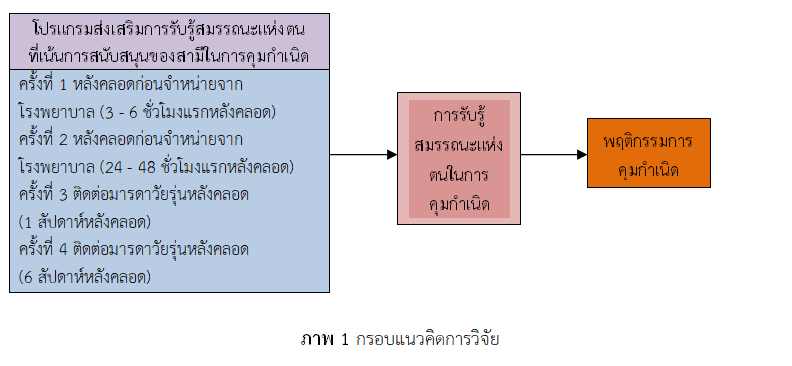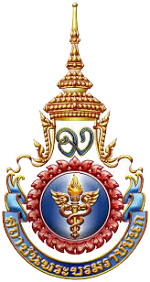ผลของโปรแกรมส่งเสริมการรับรู้สมรรถนะแห่งตนที่เน้นการสนับสนุนของ สามีต่อพฤติกรรมการคุมกำเนิดของมารดาวัยรุ่นในชุมชน
บทคัดย่อ
การวิจัยครั้งนี้เป็นการวิจัยกึ่งทดลองมีวัตถุประสงค์เพื่อศึกษาผลของการใช้โปรแกรมส่งเสริมการรับรู้สมรรถนะแห่งตนที่เน้นการสนับสนุนของสามีต่อพฤติกรรมการคุมกำเนิดของมารดาวัยรุ่นในชุมชน กลุ่มตัวอย่าง คือ มารดาวัยรุ่นครรภ์แรก จำนวน 60 คน แบ่งเป็นกลุ่มควบคุม 30 ราย และกลุ่มทดลอง 30 ราย เครื่องมือที่ใช้ในการวิจัย คือ โปรแกรมส่งเสริมการรับรู้สมรรถนะแห่งตนที่เน้นการสนับสนุนของสามี ประกอบด้วย แผนการสอน ภาพพลิก และคู่มือ ได้รับการตรวจสอบความตรงเชิงเนื้อหาแล้วจึงนำไปใช้ในการทดลอง เครื่องมือในการเก็บรวบรวมข้อมูล ได้แก่ แบบสอบถามข้อมูลทั่วไป แบบประเมินพฤติกรรมการคุมกำเนิด มีค่าความเชื่อมั่นเท่ากับ 0.98 แบบประเมินการรับรู้สมรรถนะแห่งตนในการคุมกำเนิด มีค่าความเชื่อมั่นเท่ากับ 0.94 และแบบวัดการสนับสนุนของสามีมีค่าความเชื่อมั่นเท่ากับ 0.84 วิเคราะห์ข้อมูลโดยสถิติเชิงพรรณนาและสถิติทดสอบที
ผลการวิจัย พบว่า ค่าเฉลี่ยของคะแนนพฤติกรรมการคุมกำเนิดของมารดาวัยรุ่นภายหลังได้รับโปรแกรมส่งเสริมการรับรู้สมรรถนะแห่งตนที่เน้นการสนับสนุนของสามีสูงกว่าก่อนได้รับโปรแกรมฯอย่างมีนัยสำคัญทางสถิติ (p < 0.01) และค่าเฉลี่ยของคะแนนพฤติกรรมการคุมกำเนิดของมารดาวัยรุ่นที่ได้รับโปรแกรมส่งเสริมการรับรู้สมรรถนะแห่งตนที่เน้นการสนับสนุนของสามีสูงกว่ากลุ่มที่ได้รับการพยาบาลตามปกติอย่างมีนัยสำคัญทางสถิติ (p < 0.01)
จากงานวิจัย แสดงให้เห็นถึงประสิทธิผลของโปรแกรมส่งเสริมการรับรู้สมรรถนะแห่งตนที่เน้นการสนับสนุนของสามี บุคลากรทางด้านสาธารณสุขสามารถนำไปใช้เป็นแนวทางปฏิบัติสำหรับมารดาวัยรุ่น
เอกสารอ้างอิง
Bandura, A. (1997). Self – efficacy the exercise of control. New York : W.H. Freedom and Company.
Bureau of Reproductive Health, Department of Health, Ministry of Public Health. (2020). Manual for the care of adolescent mothers. Retrieved June 20, 2023 From https://www.rh.anamai.moph.go.th/all_file/ brochure/youthmom-7%20(1).pdf. (in Thai)
Cohen, J. (1988). Statistical power analysis for the behavioral sciences. Hillsdale, Now Jersey: Lawrence Erbaum Associates.
House, J. S. (1981). Work stress and social support. New Jersey: Prentice-Hall. Jumklang, S., Srisuriyawet, R., & Homsin, P. (2017). Corrected factor with decision making of birth control implant used based on the Information-motivation behavior skills model (IBM Model) among teen mother. The Journal of faculty of Nursing Burapha University, 25(2), 31-42.
Kokkaew, A., Choolert, P., & Kulaphanich, M. (2022). The effects of a health promotion program on knowledge and self-care behavior for pregnant teenagers. Journal of MCU Nakhondhat, 20(8), 17-31.
Lerthiranwong, T. (2023). Contraceptive in teenage. Retrieved June 20, 2023 from https://www.w1.med.(mu.ac.th/obgyn/lecturestopics/topic-review/2896/. (in Thai)
Phrogram, K., Sriaporn, P., & Baosoung, C. (2022). Factors predicting functional status among adolescent mother. Nursing Journal CMU, 49(4), 292-302.
Puangniyorm, S. & Rungnoei, N. (2021). Development of a care model for preventing repeat pregnancy among adolescence Mothersin Phetchabury province. The Southern College network Journal of Nursing Public Health, 8(1), 100-114.
Rattanaviboon, P. & Puektes, S. (2020). Effect of empowerment program and infographics on contraceptive implant used for repeated adolescent pregnancy prevention. Thai Red Cross Nursing Journal, 13(2), 241-256.
Somroop, A., Deoisres, W., & Suppaseemanant, W. (2019). Factor influencing the use of postpartum contraceptive implants among primiparous adolescent. The Journal of Faculty of Nursing Burapha University, 27(3), 79-87.
Sriarporn, P., Pungbangkadee, R., Deeluea, J., Sararat, J., Chiangta, P., Jantarasuk, C., et al., (2021). Effect of contraceptive promotion program on knowledge and intention of contraceptive use among adolescent mothers. Nursing Journal, 48(1), 199-209.
World Health Organization. (2020). Adolescent pregnancy . Retrieved June 20,2023 from https://www.who.int/publications/i/item/WHO-2019_health_services-2020.

ดาวน์โหลด
เผยแพร่แล้ว
รูปแบบการอ้างอิง
ฉบับ
ประเภทบทความ
สัญญาอนุญาต
ลิขสิทธิ์ (c) 2024 วิทยาลัยพยาบาลบรมราชชนนี นครศรีธรรมราช

อนุญาตภายใต้เงื่อนไข Creative Commons Attribution-NonCommercial-NoDerivatives 4.0 International License.
บทความที่ได้รับการตีพิมพ์เป็นลิขสิทธิ์ของ วิทยาลัยพยาบาลบรมราชชนนี นครศรีธรรมราช
ข้อความที่ปรากฏในบทความแต่ละเรื่องในวารสารวิชาการเล่มนี้เป็นความคิดเห็นส่วนตัวของผู้เขียนแต่ละท่านไม่เกี่ยวข้องกับวิทยาลัยพยาบาลบรมราชชนนี นครศรีธรรมราช และบุคคลากรท่านอื่น ๆ ในวิทยาลัยฯ แต่อย่างใด ความรับผิดชอบองค์ประกอบทั้งหมดของบทความแต่ละเรื่องเป็นของผู้เขียนแต่ละท่าน หากมีความผิดพลาดใดๆ ผู้เขียนแต่ละท่านจะรับผิดชอบบทความของตนเองแต่ผู้เดียว





